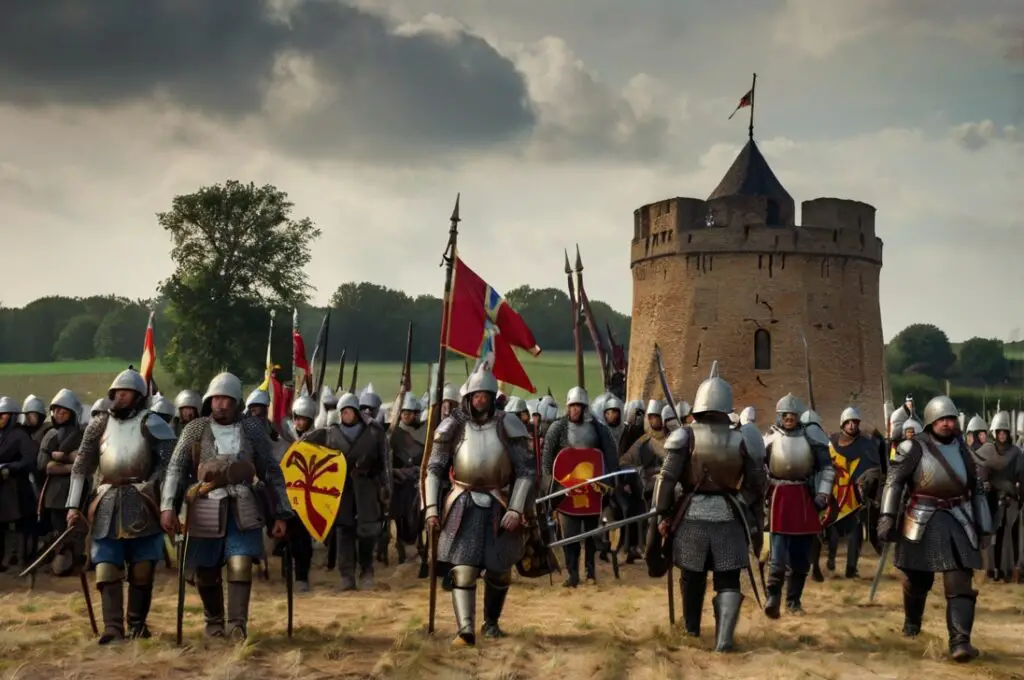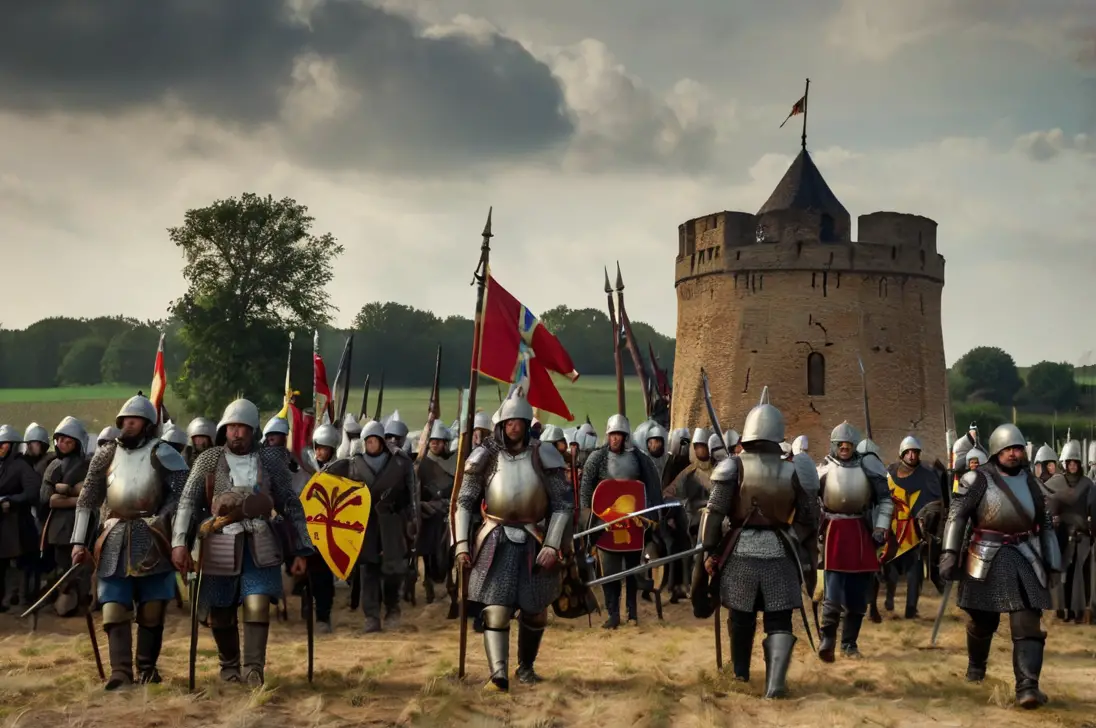
The Hundred Years’ War, fought between England and France from 1337 to 1453, was a complex and multifaceted conflict that shaped the course of European history.
This prolonged series of battles and skirmishes wasn’t just a straightforward clash over land; it was driven by a web of political, economic, and social factors.
Understanding the causes of the Hundred Years’ War requires delving into the intricate details of medieval politics, dynastic rivalries, and nationalistic fervor.
Let’s explore these elements in depth to uncover what sparked this iconic conflict.
Causes of the Hundred Years’ War
Political disputes
Succession to the French throne
A major cause of the war was the dispute over who should inherit the French throne.
In 1328, King Charles IV of France died without a male heir, leaving a power vacuum.
The French nobility chose Philip VI from the Valois dynasty as the new king.
However, Edward III of England also claimed the French crown, arguing that as the son of Charles IV’s sister, he had a legitimate right to the throne.
This disagreement over succession was a central factor that sparked the prolonged conflict.
- Read also: Understanding the Differences: World War I Vs World War II
- Read also: A Battlefield Guide: Exploring the Major Battles of World War I
English claims to French territories
Another significant cause was the English monarchy’s longstanding territorial claims in France.
These claims dated back to the Norman Conquest of 1066.
English kings controlled extensive lands in France, such as Aquitaine and Normandy, which were valuable sources of wealth and power.
The desire to either reclaim or retain these territories was a driving force behind England’s involvement in the war.
Conflicts over feudal rights and obligations
The feudal system added further complications to the relationship between England and France.
English kings, as dukes of Aquitaine, were technically vassals to the French king.
This arrangement created tension, as the English kings resented the idea of paying homage to the French king.
Disputes over these feudal rights and obligations frequently led to conflict, contributing to the outbreak of war.

Religious factors
The role of the Catholic church in Medieval politics
During the medieval period, the Catholic Church was a powerful force in politics, influencing the decisions of kings and nobles.
In the context of the Hundred Years’ War, both England and France sought the Church’s backing to strengthen their claims and actions.
The Church’s involvement made the conflict more complex, as religious and political motives became closely linked.
Disputes over papal influence and authority
Another factor that added to the tensions was the disputes over papal authority.
During this time, the papal court was located in Avignon rather than Rome, a period known as the Avignon Papacy.
This situation created divisions within the Christian world.
The alignment of the popes with the French crown at various times led to English distrust and resentment, further complicating the conflict.
Economic rivalries
Commercial competition between England and France
Economic competition was a significant factor in the Hundred Years’ War.
England and France were rivals in many commercial areas, particularly when it came to controlling valuable trade routes and resources.
For England, the wool trade was especially crucial.
Disruptions in this trade could cause economic problems, which contributed to the conflict between the two nations.
Control of trade routes and resources
Both England and France were keenly interested in controlling important trade routes and resources.
The English aimed to dominate the trade routes in the English Channel and the North Sea, while the French wanted to assert their control over these vital areas.
The struggle for economic dominance often led to military confrontations, as each side sought to secure its economic interests.

Territorial claims
English possessions in France, Such as Aquitaine and Normandy
The English held several important territories in France, including Aquitaine and Normandy.
These regions were not just economically valuable but also had significant symbolic importance.
Their control by the English was a constant source of tension and conflict.
The French crown’s desire to reclaim these lands was a major factor leading to the Hundred Years’ War.
French attempts to reclaim these territories
The French monarchy was determined to reclaim its territories from English control.
For the French, recovering these lands was a matter of national pride and sovereignty.
The persistent efforts to regain control over these regions were central to the ongoing conflict and played a key role in shaping the course of the Hundred Years’ War.
Dynastic Rivalries
The Plantagenet dynasty in England and the Capetian dynasty in France
The rivalry between the Plantagenet dynasty of England and the Capetian dynasty, which later became the Valois dynasty in France, was a key factor in the Hundred Years’ War.
Both powerful families competed for dominance, each aiming to expand their influence and territory at the other’s expense.
This intense competition between the Plantagenets and Capetians fueled much of the conflict.
Succession crises and power struggles
The war was also driven by succession crises and power struggles within both dynasties.
Disputes over who should inherit power and the shifting alliances among European nobility often led to changing loyalties and ongoing disputes.
These internal conflicts within the ruling families and their allies further intensified the war.
Nationalism and Identity
Growing sense of national identity in both England and France
During the Hundred Years’ War, both England and France experienced a rise in national identity.
People began to feel a stronger connection to their own nation and its interests.
This growing sense of nationalism played a crucial role in fueling and sustaining the conflict, as citizens increasingly supported their rulers and their causes with a heightened sense of national pride.
Tensions between English and French cultures
Cultural differences between the English and French also contributed to the conflict.
Variations in language, customs, and traditions often led to misunderstandings and hostility.
These cultural tensions were heightened by the ongoing war, making the divide between the two nations even more pronounced.

Key Events Leading to the War
The Norman conquest
The roots of the Hundred Years’ War can be traced back to the Norman Conquest of 1066.
When William the Conqueror, Duke of Normandy, successfully claimed the English throne, it established a historical connection between England and French territories.
William’s conquest set a precedent for English claims to lands in France, which would become a significant factor in later conflicts.
The Treaty of Paris (1259)
In 1259, the Treaty of Paris was signed in an attempt to resolve some of the territorial disputes between Henry III of England and Louis IX of France.
This treaty was meant to address the ongoing tensions and disputes over land.
While it did settle some issues temporarily, it left many claims and conflicts unresolved.
These unresolved tensions would later resurface and contribute to the outbreak of the Hundred Years’ War.
The Balfour Declaration (1917)
Although the Balfour Declaration of 1917 is not directly related to the Hundred Years’ War, it reflects the long-term impact of territorial and political disputes.
The declaration, issued by the British government, expressed support for the establishment of a Jewish homeland in Palestine.
This document influenced relations between Arabs and Jews in the region and highlighted how historical conflicts can have lasting consequences.
The declaration demonstrates how territorial and political issues can persist and evolve over time.
Ottoman Empire’s decline
The decline of the Ottoman Empire and the subsequent changes in the Middle East after World War I also illustrate the lasting effects of historical conflicts.
The end of Ottoman rule in Palestine and the changes that followed reshaped the political landscape of the region.
These shifts had significant implications for the local population and contributed to ongoing regional tensions.
Palestinian resistance
In response to British rule and the Zionist movement, early Palestinian resistance began to take shape.
This resistance was fueled by concerns over British policies and the aspirations of Zionists for a Jewish homeland.
The reactions and actions of Palestinians during this period reflect the broader impact of historical conflicts and territorial disputes.

- Read also: A Historical Overview: Major Battles of World War II
- Read also: Divided World: Key Events of the Cold War
Conclusion
The Hundred Years’ War was a multifaceted conflict driven by political, dynastic, economic, and cultural factors.
Understanding its causes requires examining the intricate web of claims, rivalries, and disputes that characterized the medieval period.
By exploring these elements, we gain a deeper appreciation of the complexities and enduring impact of this pivotal war.



